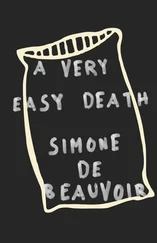I made up my mind to go out and get a breath of the summer heat. A tall negro in an electric blue raincoat and a grey felt hat was listlessly sweeping the pavement: before, it used to be an earth-coloured Algerian. In the boulevard Edgar-Quinet I mingled with the crowd of women. As I almost never go out in the morning any more, the market had an exotic air for me (so many morning markets, beneath so many skies). The little old lady hobbled from one stall to another, her sparse hair carefully combed back, her hand grasping the handle of her empty basket. In earlier days I never used to worry about old people; I looked upon them as the dead whose legs still kept moving. Now I see them—men and women: only a little older than myself. I had noticed this old lady at the butcher’s one day when she asked for scraps for her cats. ‘For her cats!’ he said when she had gone. ‘She hasn’t got a cat. Such a stew she’s going to make for herself!’ The butcher found that amusing. Presently she will be picking up the leavings under the stalls before the tall negro sweeps everything into the gutter. Making ends meet on a hundred and eighty francs a month: there are more than a million in the same plight: three million more scarcely less wretched.
I bought some fruit, some flowers, and sauntered along. Retired: it sounds rather like rejected, tossed on to the scrap-heap. The word used to chill my heart. The great stretch of free time frightened me. I was mistaken. I do find the time a little too broad over the shoulders; but I manage. And how delightful to live with no imperatives, no kind of restraint! Yet still from time to time a bewilderment comes over me. I remember my first appointment, my first class, and the dead leaves that rustled under my feet that autumn in the country. In those days retirement seemed to me as unreal as death itself, for between me and that day there lay a stretch of time almost twice as long as that which I had so far lived. And now it is a year since it came. I have crossed other frontiers, but all of them less distinct. This one was as rigid as an iron curtain.
I came home; I sat at my desk. Without some work I should have found even that delightful morning insipid. When it was getting on for one o’clock I stopped so as to lay the table in the kitchen—just like my grandmother’s kitchen at Milly (I should like to see Milly again)—with its farmhouse table, its benches, its copper pots, the exposed beams: only there is a gas-stove instead of a range, and a refrigerator. (What year was it that refrigerators first came to France? I bought mine ten years ago, but they were already quite usual by then. When did they begin? Before the war? Just after? There’s another of those things I don’t remember any more.)
André came in late; he had told me he would. On leaving the laboratory he had attended a meeting on French nuclear weapons.
‘Did it go well?’ I asked.
‘We settled the wording of a new manifesto. But I have no illusions about it. It will have no more effect than the rest of them. The French don’t give a damn. About the deterrent, the atomic bomb in general—about anything. Sometimes I feel like getting the hell out of here—going to Cuba, to Mali. No, seriously, I do think about it. Out there it might be possible to make oneself useful.’
‘You couldn’t work any more.’
‘That would be no very great disaster.’
I put salad, ham, cheese and fruit on the table. ‘Are you as disheartened as all that? This is not the first time you people have been unable to make headway.’
‘No.’
‘Well, then?’
‘You don’t choose to understand.’
He often tells me that nowadays all the fresh ideas come from his colleagues and that he is too old to make new discoveries: I don’t believe him. ‘Oh, I can see what you are thinking,’ I said. ‘I don’t believe it.’
‘You’re mistaken. It is fifteen years since I had my last idea.’
Fifteen years. None of the sterile periods he has been through before have lasted that long. But having reached the point he has reached, no doubt he needs a break of this kind to come by fresh inspiration. I thought of Valéry’s lines
Chaque atome de silence Est la chance d’un fruit mûr.
Unlooked-for fruit will come from this slow gestation. The adventure in which I have shared so passionately is not over—this adventure with its doubt, failure, the dreariness of no progress, then a glimpse of light, a hope, a hypothesis confirmed; and then after weeks and months of anxious perseverance, the intoxication of success. I do not understand much about André’s work, but my obstinate confidence used to reinforce his. My confidence is still unshaken. Why can I no longer convey it to him? I will not believe that I am never again to see the feverish joy of discovery blazing in his eyes. I said, ‘There is nothing to prove that you will not get your second wind.’
‘No. At my age one has habits of mind that hamper inventiveness. And I grow more ignorant year by year.’
‘I will remind you of that ten years from now. Maybe you will make your greatest discovery at seventy.’
‘You and your optimism; I promise you I shan’t.’
‘You and your pessimism!’
We laughed. Yet there was nothing to laugh about. André’s defeatism has no valid basis: for once he is lacking in logical severity. To be sure, in his letters Freud did say that at a given age one no longer discovers anything new, and that it is terribly sad. But at that time he was much older than André. Nevertheless this extreme gloominess still saddens me just as much, although it is unjustified. And the reason why André gives way to it is that he is in a state of general crisis. It surprises me, but the truth of the matter is that he cannot bring himself to accept the fact that he is over sixty. For my own part I still find countless things amusing: he does not. Formerly he was interested in everything: now it is a tremendous business to drag him as far as a cinema or an exhibition, or to see friends.
‘What a pity it is that you no longer like walking,’ I said. ‘These days are so lovely! I was thinking just now how I should have liked to go back to Milly, and into the forest at Fontainebleau.’
‘You are an amazing woman,’ he said with a smile. ‘You know the whole of Europe, and yet what you want to see again is the outskirts of Paris!’
‘Why not? The church at Champeaux is no less beautiful because I have climbed the Acropolis.’
‘All right. As soon as the laboratory closes in four or five days’ time, I promise you a long run in the car.’
We should have time to go for more than one, since we are staying in Paris until the beginning of August. But would he want to? I said, ‘Tomorrow is Sunday. You’re not free?’
‘No, alas. As you know there’s this press-conference on apartheid in the evening. They’ve brought me a whole pile of papers I have not looked at yet.’
Spanish political prisoners; Portuguese detainees; persecuted Persians; Congolese, Angolan, Cameroonian rebels; Venezuelan, Peruvian and Colombian resistance fighters; he is always ready to help them as much as ever he can. Meetings, manifestoes, public gatherings, tracts, delegations—he jibs at nothing.
‘You do too much.’
What is there to do when the world has lost its savour? All that is left is the killing of time. I went through a wretched period myself, ten years ago. I was disgusted with my body; Philippe had grown up; and after the success of my book on Rousseau I felt completely hollow inside. Growing old filled me with distress. But then I began to work on Montesquieu, I got Phillipe through his agrégation * and managed to make him start on a thesis. I was given a lectureship at the Sorbonne and I found my teaching there even more interesting than my university-scholarship classes. I became resigned to my body. It seemed to me that I came to life again. And now, if André were not so very sharply aware of his age, I should easily forget my own altogether.
Читать дальше












